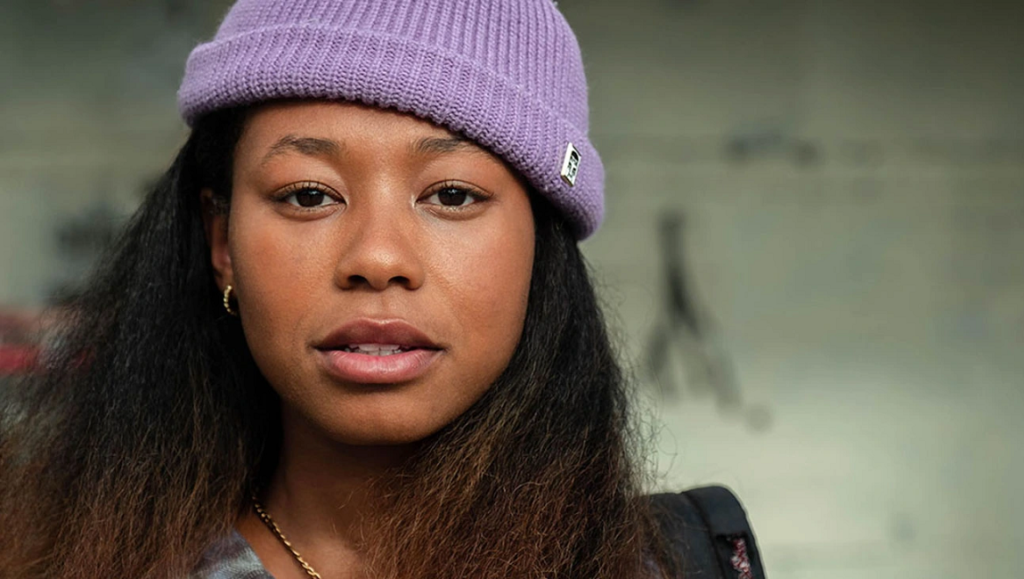The well-intentioned On the Come Up wants to challenge audiences, but can’t overcome a wholly inauthentic and sanitized presentation of its material.
After Rosie Thomas shot to literary stardom with breakout YA sensation The Hate U Give, a couple things became inevitable: 1.) A film adaptation would follow in short order to capitalize on the zeitgeist appeal and contemporaneous socio-political immediacy; 2.) Thomas would quickly write a next novel occupying the same discursive and demographic lane. Of course, both came quickly after The Hate U Give’s initial release — the film adaptation was released 19 months later, and follow-up work On the Come Up hit bookstores another 5 months after that — but more surprising is that the film adaptation proved surprisingly adept. Surprising because The Hate U Give, which directly addresses the plague of police violence against Black populations, was primed for schlocky Afterschool Special territory given Hollywood’s penchant for reductive interpretation of basically all substantive rhetoric. And while it does take ill-advised turns into such territory — landing on the wrong side of the debate (or at least ignoring the larger systemic picture) when it comes to criminalizing drug dealing, presenting caricatural racism as a bigger threat than the fake woke or middle-ground equivocators — and is certainly didactic, there’s a genuine authenticity and emotional potency, as well as exceptional and vulnerable performances, that carry the film through. Or to put it another way: it mostly strikes an affecting and workable balance between activism and art.
Unfortunately, the same can’t be said of On the Come Up’s film adaptation. Bri is a high-school-aged rapper trying to live up to the legacy of her father, a hip hop legend who was murdered when she was young. Her mother (Sanaa Lathan; also here directing for the first time) is a recovering heroin addict whom Bri keeps at somewhat of an emotional distance, while her maternal aunt, Pooh (Da’Vine Joy Randolph), is both a local drug dealer and her manager. After bombing her first go in the Ring, the legendary rap battle HQ of the film’s fictional Garden Heights neighborhood, Bri bodies more established rapper Milez — he even has a number one radio hit — on her next attempt, and begins to find whirlwind success in the music industry, as well as a morass of ethical, personal, and interpersonal complications in what amounts to a pretty basic too-big-for-your-britches narrative arc. This familiar rise-to-the-top plotting is here given some hip hop culture specificity in the form of debates about authenticity, the sometimes violent nature of rap music, and other generic notions about selling out, but it’s all a far cry from the more universal and even existential concerns addressed in The Hate U Give, delivering platitudes rather truths.
But far more problematic than the softer thematic concerns is On the Come Up’s utterly artificial feel. The film takes obvious cues from the likes of 8 Mile and Hustle & Flow, but has none of the lived-in texture or underground griminess of those films, with Lathan instead shellacking everything here in Hollywood sheen to the point that this bears little DNA with those early-aughts battle rap touchstones. A closer analog in style would be Joseph Kahn’s slicker, excellent Bodied from 2017, but On the Come Up fares even more poorly by that comparison: not only do this film’s sociocultural concerns seem downright Mickey Mouse by contrast, but the actual lines spit here feel like something you might overhear at a flyover playground rather than from ascendant MCs. The distancing effect this creates is a difficult one to overcome, with things feeling specious at best and Disney-fied at worst, and that’s before you bring in the likes of GaTa and Lil Yachty to engage in a little cornball battling with Bri. The vibe is actually more in line with the latter Step Up films, but if their sense of style and play was instead replaced with the po-faced seriousness of someone deeply out of touch with hip hop culture (a co-sign from Method Man playing a smarmy producer doesn’t change that calculus).
As with The Hate U Give, it’s tough to be too critical of works of such representational worth and which are willing to engage these kinds of topics in the commercial mainstream. There’s occasionally an incisive bit of commentary to light upon, and Gray delivers a performance of legitimate presence, one that frequently helps distract from the generic template undergirding the material’s littered rap-centric specifics. But the presentation of hip hop culture is too counterfeit and the path to an inevitable feel-good destination too uncomplicated for Lathan’s film to muster much genuine weight. Instead, On the Come Up is bodied by its own glib designs.
You can watch Sanaa Lathan’s On the Come Up in theaters or streaming on Paramount+ beginning on September 23.


Comments are closed.